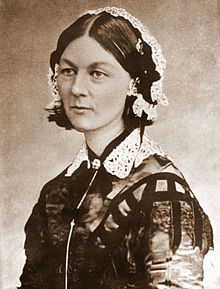
Born on 12th May 1820 in Florence, Italy, to a wealthy British family, Florence Nightingale was known for carrying a lamp around the wards of army hospitals taking care of the injured soldiers during the Crimean War and improving the sanitation of the hospitals.
Click ‘Read more’ to find out more about the life of Florence Nightingale
From a young age Florence attended to the sick in her village. By the age of 16 she was certain she wanted to pursue a career in nursing. In 1844 she enrolled as a nursing student at a German hospital. When she moved back to England she started a job working as a nurse in a Middlesex hospital, and within a year she was promoted to superintendent, tackling a cholera outbreak which rapidly spread due to the unsanitary conditions.

During the Crimean War, Nightingale was asked to organise a group of nurses to be sent out and tend to the injured British soldiers. When the nurses arrived in Turkey they were shocked at the poor conditions. Rodents and bugs ran among patients who laid on stretchers on the floor. Soldiers were starting to die from infections not related to their injuries in battle. To prevent more infections spreading, Nightingale gathered hundreds of scrubs and set out to clean the hospital – even asking the less injured patients to help improving the sanitation. At night she would carry a lamp as she made her rounds tending to the patients, and earned her nickname ‘The Lady with the Lamp’. Her work reduced the deaths in the hospital dramatically.
As well as improving the sanitary levels of the hospital, Nightingale also set up many services to improve the patients’ stay. These including a classroom and library for entertainment, and laundry so patients could have clean linens. Queen Victoria awarded Nightingale’s work with an engraved brooch and £250,000 (the equivalent of around £31,000,000 today!) which she used to fund the establishment of St. Thomas’ Hospital, and within it, the Nightingale Training School for Nurses.
Florence Nightingale quotes
“The very first requirement in a hospital is that it should do the sick no harm”
“I attribute my success to this:— I never gave or took an excuse”


 4
4

















